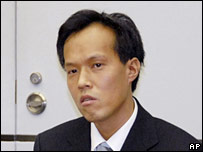 A Japanese man has survived for 24 days in cold weather and without food and water by falling into a state of "hibernation", his doctor has said.
A Japanese man has survived for 24 days in cold weather and without food and water by falling into a state of "hibernation", his doctor has said.Mitsutaka Uchikoshi, 35, went missing on 7 October after going with friends to climb Mount Rokko, western Japan.
He had almost no pulse, his organs had been shut down and his body temperature dropped to 22C (71F) when he was found.
Medics say they are still puzzled how he survived because his metabolism was apparently almost at standstill.
Mr Uchikoshi is believed to have tripped and lost consciousness after leaving his party to descend from the mountain on his own.
"I lay down... in a grassy area, which felt good in the sunshine, and eventually I fell asleep," Mr Uchikoshi told reporters at a news conference at a hospital in Kobe, where he was treated.
"That's the last thing I remember," he said.
Mr Uchikoshi's temperature is believed to have dropped as he laid in cold weather of about 10C (50F), greatly slowing down his metabolism.
He was found by rescuers on 31 October.
"He fell into a hypothermic state at a very early stage, which is similar to hibernation," said Dr Shinichi Sato, who treated Mr Uchikoshi.
"Therefore, his brain functions were protected without being damaged and have now recovered 100%. This is what I believe happened," he said.
Mr Uchikoshi - who had been treated for severe hypothermia, multiple organ failure and blood loss - was released from hospital and returned home on Tuesday.
Professor Hirohito Shiomi, a hibernation expert at a university in Hiroshima, was quoted by the Associated Press news agency as saying the case was "revolutionary, if the patient truly survived at such a low body temperature over such a long period of time".
Scientists have for years suggested that human hibernation is possible, and could be used to slow cell death when treating fatal diseases.
No comments:
Post a Comment